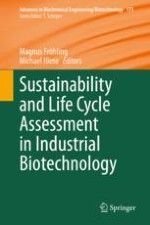This book reviews the assessment of industrial biotechnology products and processes from a sustainable perspective. Industrial Biotechnology is a comparably young field which comes along with high expectations with regard to sustainability issues. These stem from the promise of reducing greenhouse gas emissions and replacing fossil resources in the near or later future and using green technology, i.e. more environmentally friendly technologies. The intended economic, ecological and social benefits, however, need to be proven, resulting in a variety of challenges, both from a methodological and application point of view.
In this book, specific assessment and application topics of industrial biotechnology are addressed, highlighting challenges and solutions for both developers and users of assessment methods. In twelve chapters, experts in their particular fields define the scope, characterize industrial biotechnology and show in their contributions the state of the art, challenges and prospects of assessing industrial biotechnology products and processes.
The chapter 'Societal and Ethical Aspects of Industrial Biotechnology' of this book is available open access under a CC BY 4.0 license at link.springer.com
